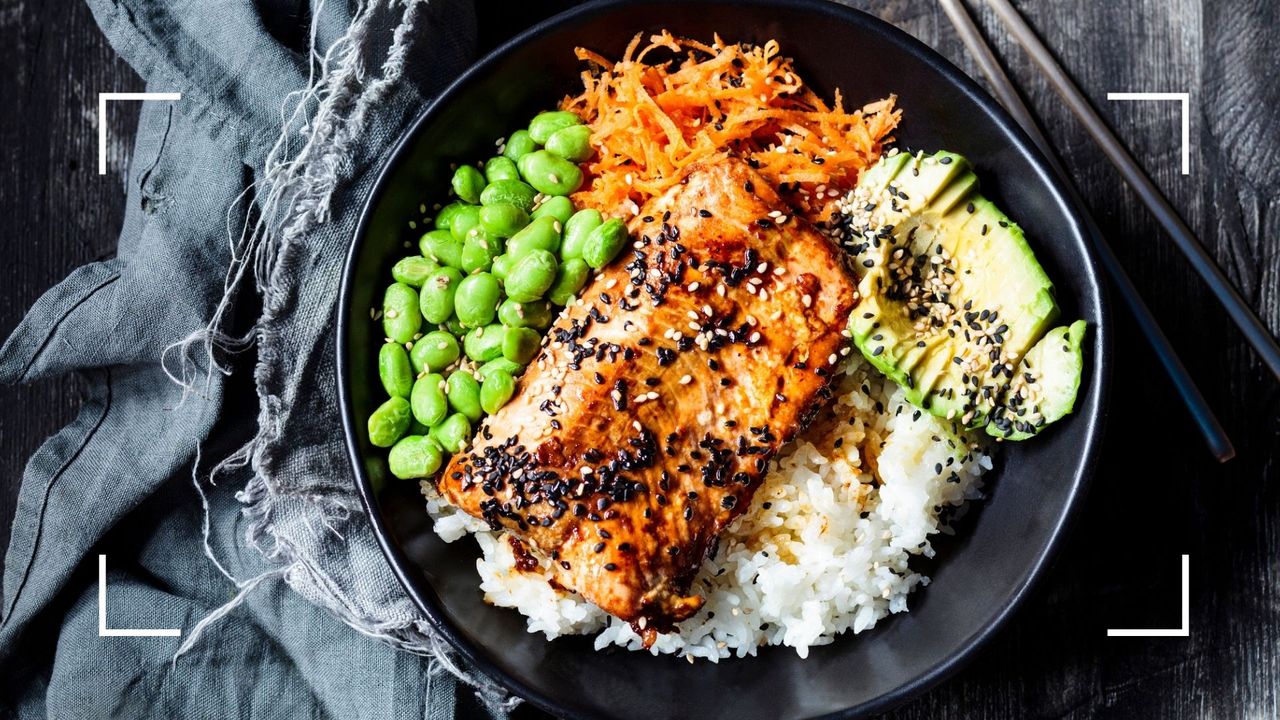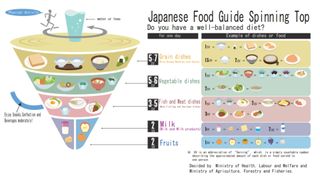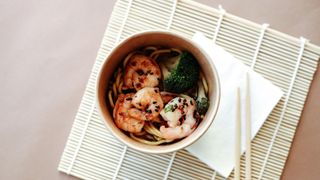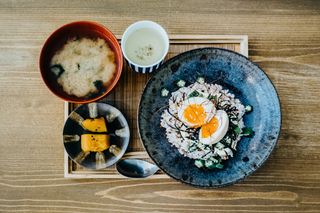Why is the Japanese diet so good for you?
Whether it’s to eat healthier or lose weight, the Japanese diet can offer plenty of health benefits. Here, experts explain why


Today the Japanese diet is influenced by many different cuisines, but the traditional Japanese diet is full of fresh, unprocessed foods that have amazing health benefits.
Whether you're looking to lose weight or just start eating healthier, much of the nutritional advice out there promotes eating plenty of fruits and vegetables and orientating food choices around high-protein, high-fiber foods that are low in saturated fats. But if you're new to this way of eating, it can be difficult to know what foods to eat.
Much like the Mediterranean diet, the Japanese diet revolves around fresh ingredients with very few processed products or sugar. This naturally makes it a winner when it comes to weight loss, but why else is the Japanese diet so healthy? Makiko Sano, an expert in Japanese food and author of Sushi Slim, and two brain scientists explain.
What is the Japanese diet?
The Japanese diet is a way of eating that's entirely based on unprocessed, seasonal foods served in a variety of small-plated dishes. As well as being rich in nutrients like protein and fiber, full of vitamins, it's low in sugar, and saturated fat, and free of processed foods.
The main components include:
- Rice
- Noodles
- Fish and other seafood
- Tofu and other soy products
- Seaweed
- Plenty of fresh or cooked fruits and vegetables.
- A selection of dairy products including eggs
- Limited amount of meat
Green tea and cold barley tea are also important components of the traditional Japanese diet, while any alcohol is typically a dinner-only beverage, and snacking is an uncommon practice.
The Japanese diet is actually the umbrella term for the way of eating referred to here though. This style of eating originates from Okinawa, which is located just off the coast of Japan between the East China and the Philippine Seas. Okinawa is the largest Ryukyu Island and is famous for being one of the world's 'blue zones'. People who live here tend to have significantly longer and healthier lives than those living elsewhere in the world, National Geographic explorer Dan Buettner found, thanks in part to the food they eat.
Sign up for the woman&home newsletter
Sign up to our free daily email for the latest royal and entertainment news, interesting opinion, expert advice on styling and beauty trends, and no-nonsense guides to the health and wellness questions you want answered.
Today, those living in the country are advised to follow The Spinning Top principle. Similar to the UK's NHS-approved Eat Well Guide and developed by the National Centre for Global Health and Medicine in Tokyo, it advises people to prioritize the same principles as the traditional Japanese diet for longer life expectancy and overall health.

Why is the Japanese diet so good for you?
1. Reduces the risk of Alzheimer's
The Okinawa population doesn't only live longer but rates of Alzheimer's are 75% less than elsewhere in the world, brain health expert Professor James Goodwin explains.
The phenomenon can be explained by the diet, he says, as the Okinawa diet is extremely varied and plant-rich, lower in calories, and it contains plenty of fruits and vegetables which are high in phytonutrients such as flavonoids. It's these that are the game-changer.
"A recent study by Harvard University has highlighted the benefits of the daily consumption of brightly colored fruits and vegetables to reduce the risk of developing dementia," he says. "Those who consumed the highest amounts of flavonoids had a 20% less risk of cognitive decline, with yellow or orange fruits and vegetables. Oranges, grapefruits, peppers, and bananas all had the strongest brain-protective qualities."
This has a huge impact on overall health and particularly women's health, as according to the World Health Organisation's most recent statistics, Alzheimer's is the seventh leading cause of death in the world. While the stages of Alzheimer's affect everyone, regardless of country, it's women who are disproportionately affected as they represent 65% of deaths from the disease.
2. And improves brain health overall
It's not only the risk of Alzheimer's that you can reduce with a diet high in flavonoids, adds Jeremy Spencer, professor of nutritional biochemistry.
"Flavonoids have also been shown in human clinical trials, conducted on behalf of the American Society for Nutrition, to provide strong protection against the development of other chronic diseases," he says, pointing to findings that the nutrients have been shown to reduce risk of death from cardiovascular disease by 27%. As the leading cause of death around the world, according to WHO, it's a major consideration for anyone considering taking on the Japanese diet.
"These studies also add to a growing body of human clinical evidence indicating that increasing the intake of dietary flavonoids, mainly through the consumption of plant foods, protects against the progression of neurodegenerative disorders such as dementia and Parkinson's disease," he says.
"It may also lead to enhancements in cognitive function in healthy individuals."

3. Encourages a healthier approach to eating
In the UK and US, there's so much focus on consuming a particular number of calories per day that there's even calories on menus now. But the traditional Japanese diet veers away from this approach—for the better.
While intuitive eating, where you listen to your body's cues around food and stop eating when you're full instead of calorie counting or dieting, is seen as the 'anti-diet' approach in the West. But it's a common practice of eating in the traditional Japanese diet.
"In the Okinawa region, calorie counting is not seen as a constraint but as a cultural practice," Professor James Goodwin says. "It comes from the ancient belief of 'hara hachi bu' and acts as a reminder to stop eating when you are 80% full. Eating slower allows your body to respond to cues that you are no longer hungry and also encourages more mindful drinking and eating."
4. Reduces inflammation
It's not only our brains and body weight that benefit from a traditional Japanese diet though. Inflammation, which produces symptoms including fatigue, body pain and weight flutuations, occurs when the immune system is forced to fight off viruses, injuries, or toxins, whether that's a common cold or an imbalance of bacteria in the gut.
"Processed food, ready meals, takeaways and food that comes out of a packet often cause inflammation and rarely contain any useful nutrients that allow the body to thrive," Professor Goodwin explains. These types of food are prominent in a Western diet but they tend to alter the bacteria that live in the gut, research from Ghent University suggests. This alteration interferes with the immune system and forces it to fight, leading to chronic inflammation in some people.
"The Okinawa diet is not just about eating less, but is extremely varied and plant-rich, resulting in lower calorie intake and high consumption of phytonutrients, such as flavonoids. As plant foods are less calorie dense, this diet offers a low glycaemic load, reducing inflammation and oxidative stress to regulate age-related biological pathways," Professor Goodwin says.
You don't necessarily need to follow a strict diet to combat this though, he adds/ "Aim to increase your dietary diversity by consuming 30 different plant-based foods each week, from a range of different fruit, vegetables, grains, pulses, nuts & seeds, herbs & spices."
5. Improves digestive health
Speaking of gut health, there's another component of the Japanese diet that does wonders for the body. "Sushi translates to vinegared rice," Sano says. "Vinegar and other acetic acid-based pickles, ubiquitous in Japanese food, have a distinct effect on how we digest fat when eaten as part of a meal."
Acetic acid increases colonic blood flow and ileal motility, research by Sun Yat-sen University found, as well as being anti-inflammatory. As the colon has less blood flow through the tissue than any other part of the intestinal system, improving circulation through this area can help to reduce the risk of colonic ischemia—symptoms which include bloating, abdominal pain, and diarrhea if left untreated—according to the American College of Gastroenterology.
Acetic acid is also thought to be responsible for any health benefits associated with the apple cider vinegar diet, as the acid makes up around 6% of the product.
6. High in collagen
Collagen is a protein that gives skin structure, stretch, and suppleness. While it's naturally occurring, as we age, our collagen levels begin to dip and this is when wrinkles and thinning skin appear.
While it's the new thing in beauty regiments, with plenty of drinks out there on the market claiming to offer a youthful complexion at every sip, it's typically found in fish, seafood, eggs, and citrus fruits among others. This makes it a common component in the traditional Japanese diet, a big bonus for following the plan.
Sano says, "A friend of mine first made me collagen soup in my teens and I've been hooked ever since. Even the morning after drinking it, my skin looks firmer and plumper. And it's not just my imagination. A study published in the Japanese Journal of Complementary and Alternative Medicine found that drinks containing 10g of collagen produced a 50% observable effectiveness against wrinkles and skin moisture content within one week. I eat it twice a week."
While evidence around high-collagen foods and supplements is relatively limited, early research from CHA University suggests that taking supplements or eating foods high in collagen can boost levels of the protein in your skin, mainly aiding hydration.

Japanese diet for weight loss
The Japanese diet has so many health benefits and it can also help you lose weight if that's your goal. While a calorie deficit to lose weight is the best (and only way) to go about it, as even following this diet you'll need to make sure you're eating fewer calories than you burn every day, the Japanese diet does offer some help.
"Slowing the rate at which you eat allows your brain to notice when you feel full," Makiko Sano says. "Japanese people find it easier to notice when we are full because we use chopsticks, which are a more time-consuming way to eat."
Also because of the way food is presented in three or four dishes, she adds, meals typical in the Japanese diet give the impression of being bigger than they are. For those looking to learn how to eat less and have better portion control, this presentation could be useful.
"At least one of the dishes will be a low-calorie, filling soup," Sano says. "A typical set of sushi contains about 300 calories as well, while an average Western plate of food can be 500 calories or more than this."
Japanese people do eat some meat, she adds, "but not much compared to the Western diet." While meat is a good source of lean protein if you opt for chicken, it can also be relatively high in fat, which is higher in calories than other macronutrients. And similarly, there's not much dairy included in the traditional Japanese diet, aside from eggs.
"Meat and dairy aren't a big part of it," she says. "These two foods are high in fat and responsible for much of the Western daily calorie intake."

Grace Walsh is woman&home's Health Channel Editor, working across the areas of fitness, nutrition, sleep, mental health, relationships, and sex. She is also a qualified fitness instructor. In 2025, she will be taking on her third marathon in Brighton, completing her first ultra marathon, and qualifying as a certified personal trainer and nutrition coach.
A digital journalist with over seven years experience as a writer and editor for UK publications, Grace has covered (almost) everything in the world of health and wellbeing with bylines in Cosmopolitan, Red, The i Paper, GoodtoKnow, and more.
-
 Babyliss' new hot brush is brilliantly affordable, but can it create the luxe blow dry of its rivals?
Babyliss' new hot brush is brilliantly affordable, but can it create the luxe blow dry of its rivals?A beauty editor's honest guide to the BaByliss Air Power Volume Hot Brush – how well does it perform?
By Lucy Abbersteen Published
-
 The White Lotus' Michelle Monaghan has been using this 'airbrushing' concealer for 20 years - and as if by fate, it's 20% off
The White Lotus' Michelle Monaghan has been using this 'airbrushing' concealer for 20 years - and as if by fate, it's 20% offThe staying power of Michelle Monaghan's concealer in just her makeup bag alone is reason enough to invest...
By Naomi Jamieson Published